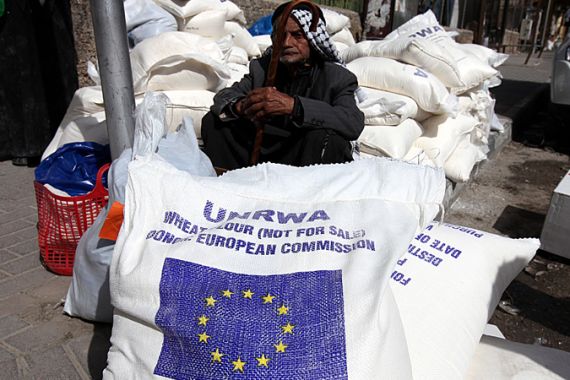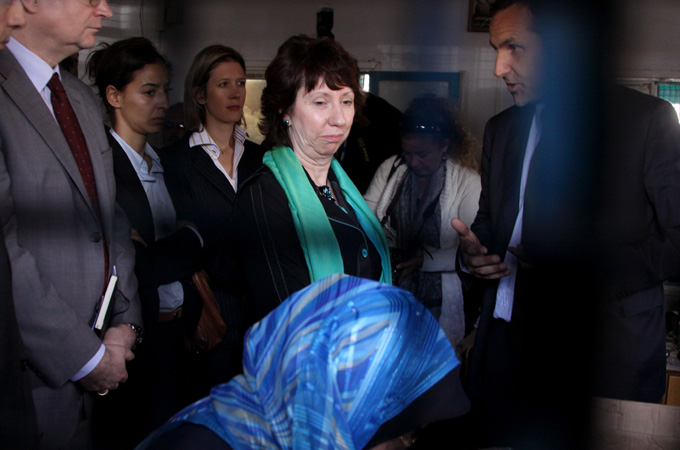EU Mideast role: go big or go home
Bloc’s exclusion from the Palestinian-Israeli talks concerns key member states, but the cause may be self-inflicted.

 |
| Bernard Kouchner, the French foreign minister, said it was “shame” that EU was locked out from launch of talks [Getty] |
The European Union (EU) was not present at the initial round of direct talks between the Israelis and Palestinian Authority (PA) in Washington and was again excluded from the current gathering at Sharm el Sheikh. This is not the first time that EU involvement in the peace process has been stalled, a situation that is untenable for one major power broker within the bloc, the French.
Bernard Kouchner, the French foreign minister, lamented that it was “a shame” that the EU was locked out. He also sent a letter to the EU headquarters in Brussels complaining that the EU, as the largest aid donor to the PA and a member of the Quartet, the international body dealing with the peace process, should be playing an active and participatory role in the process. Exclusion from the two high level diplomatic engagements is wholly contrary to this end.
Diplomatic periphery
European diplomats and politicians who struggle to have the EU politically visible have always voiced their concern following the relegation of the EU’s role to the periphery, a development that has led to the discrediting of the EU as a diplomatic force on the global stage.
|
“The Europeans will not be useful in the Middle East talks in a million years” Henry Kissinger, the former US secretary of state, 1974 |
“I do not see why Kouchner should be infuriated [by] the EU’s lack of presence,” says Fabrice Pothier, the director of Carnegie Europe. “Kouchner’s comments are political noise; there is a difference between political noise and political rationale. The EU has no influence on the negotiations – there is no role for it to fill.”
Olivier Roy, an international relations professor at European University Institute, also believes that the EU has little to offer in the current negotiations: “Inviting them would have only created confusion.” The EU, a bloc of 27 member states, has an undecided policy towards the Middle East and the lack of cohesion among the member states has produced an inconsistent stance towards the Israeli-Palestinian conflict.
The internal divisions within the then European Community (EC) and the ensuing effects on foreign affairs compelled Henry Kissinger, the former US secretary of state, to declare in 1974 that “the Europeans will not be useful in the Middle East talks in a million years”.
Kissinger’s statement may have been made somewhat defunct by a historical dialectic that argues the value of various European led political initiatives in the peace process post 1974.
Major initiatives
The first major initiative by the then EC came in June 1980 with the Venice Declaration. Through it the ‘bloc’ acknowledged the right of Palestinians to self-determination and recognised the Palestine Liberation Organisation (PLO), then headed by Yasser Arafat, at a time when both the US and Israel still considered it a terrorist organisation. The document stirred criticism from the US but was instrumental in paving the way to further peace negotiations.
Another instance of a tactful gain for the EU came in March 1999. The EU issued the Berlin Declaration, which included an explicit commitment to the creation of a Palestinian state. A similar declaration by the US only followed in 2002 when George Bush, the then president, acknowledged that the two-state solution was the ultimate goal on his road map to peace.
However, Nick Witney, a senior fellow at The European Council on Foreign Relations, maintains that the above examples were “isolated and exceptional cases”. Excluding these instances, Whitney says the EU has been politically dormant.
Economic aid
One area where there is tacit agreement between EU member states is in the transfer of donor aid to the Palestinian Authority (PA), giving more than $500m per year, making the EU the largest donor.
Though economic aid can be seen as a political gesture, the EU has undoubtedly been impotent in leading the charge for a political solution to the search for peace in the region. A passive stance has essentially yielded the floor to its transatlantic neighbour, who has an alternative vision of a road to peace.
The EU prided itself as an “honest broker” in the conflict, which essentially meant “not taking any step that may offend the Americans,” David Cronin, a Brussels-based journalist and blogger, says. Lisa Goldman, a Tel Aviv-based journalist, also believes that “the EU tends to follow the US’s lead in supporting Israeli policies. So I am not sure that their involvement in the peace process would be positive.”
In 2003, the EU emulated the US decision of putting Hamas on its list of terrorist organisations. Though undoubtedly having a militant wing, Hamas is a political entity that has successfully participated in the democratic process and represents at least half of the Palestinian movement. By not being forthcoming with all parties of the conflict, “the EU simply locked itself in the corner,” Cronin says.
And while the EU, before 2004, found the Israeli settlements in East Jerusalem and the West Bank to be the main stumbling block to peace and urged Israel to “reverse its settlement policy” altogether, it has finally succumbed to US pressure and failed to maintain such a stance. From then on, the EU called on Israel only to “suspend settlement activities” rather than repeal them altogether.
Vox populi
Public opinion in the Middle East regarding the EU and its efforts to forge peace is belatedly circumspect, positive in regards to the few notable triumphs, but disheartened by the overall indirect approach and suspicious of the ‘blocs’ acquiescence to the US and its motives. “This approach has cost the EU a great deal, not only financially. It has tarnished the reputation of the Union,” Witney says. “The more the EU decides to carry on with its policy of being passive, the more it is seen as a hypocrite.”
 |
| Ashton refused to meet Hamas officials in Gaza [EPA] |
To have a real impact on the peace process, many analysts say that the EU should, first and foremost, fill the gap that the US has left by refusing to talk to Hamas. The Union should accommodate all parties of the conflict, “distinguish between the political and armed wing of Hamas and press the US to end this unproductive policy of isolating them,” Cronin says.
When Catharine Ashton, the EU foreign policy chief, visited Gaza in July to see how EU aid is being used, she refused to meet with Hamas officials. “Where in the world would [a politician] go to a place without meeting its political leadership?” Cronin asks.
Taking a stance
“The EU may be afraid of taking a forceful political stance that may offend the US or Israel and therefore harm the peace process, but what peace process? It is specifically a bold EU stance that could help launch genuine negotiations, that brings together all parties concerned, including grass-root widely supported Hamas.”
The second move that the EU should take is to make use of the fact that it not only has the strongest economy in the world, but also remains Israel’s largest market for exports and its second largest source of imports after the US. However, “the EU has been unwilling to explore how it could use this strategic economic relationship with Israel to exert pressure,” argues Fabrice Pothier of Carnegie Europe.
Witney recalls the effectiveness of sanctions against South Africa and the role of concerted economic pressure in abolishing the apartheid system in 1994. “History has justified the judgement behind taking [such] measures.” With Israel being unmoved by any of the EU’s declarations to suspend settlements and agree to work towards a fair solution to the conflict, this may be an approach the bloc should consider.
Roy maintains that “the EU’s refusal to buy Israeli products and the imposition of sanctions has a very important political dimension”. It is not participation in political events that would transform the EU into an effective political player.
Past exclusions
This is not the first time that the EU has been sidelined from high-level talks and thus not being invited to co-sponsor the Washington negotiations should not have come as a surprise. Nineteen years earlier, the bloc lobbied intensely to be a co-sponsor, along with the Americans and Russians, of the Madrid talks. However, it was only able to secure an observer status along with Australia, Canada, Japan, Norway and other countries.
For the EU to re-enter the peace process as a major contributor, it has to seize the initiative and formulate bold diplomatic language and ultimately, ventures, not just humble gestures. In the words of some mythical Hollywood icon “go big or go home”.
“We have been in diplomacy for centuries. The US needs us and we are not ready to leave the boat,” the words of a French official hardly inspire aspirations of bold leadership. Maybe a timid approach is set to be with us for years to come, the question is at whose cost?